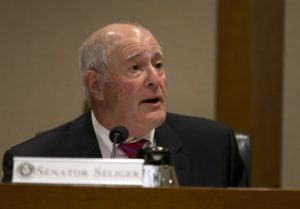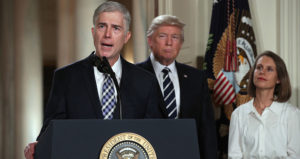
I have had the pleasure and the honor of knowing many honorable men and women in public life throughout my 37 years in journalism. This blog post is about one of the good guys I have had the honor of knowing professionally and personally.
I wrote it initially for another medium, but I have chosen to post it here. My interview with state Sen. Kel Seliger took place just before Donald Trump’s inauguration as president of the United States.
***
On a day just prior to the inauguration of President Donald J. Trump – when Gov. Greg Abbott and Lt. Gov. Dan Patrick were out of the state to attend the festivities in Washington, D.C. – Kelton Gray “Kel” Seliger had the task of serving as Texas’s acting governor.
It’s a responsibility – absent the perks of the job – granted to him by Patrick, who just days earlier had named him president pro tem of the Texas Senate. He was put in charge of the state in the absence of the two top statewide elected officials.
Seliger, a Republican who has served in the Senate since 2004, didn’t arrive this day with any Texas Rangers security detail in tow. There were no special arrangements made, no announcement of his arrival, no fanfare.
Seliger represents a district that stretches from the Texas-Oklahoma border about 100 miles of Amarillo to the Permian Basin, which is another 200 miles south. He maintains Senate offices in Amarillo and Midland and is now essentially a full-time legislator, having sold the steel business he owned with his brother, Lane, several years ago.
He is a native of Borger who graduated from Dartmouth College in Hanover, N.H., and who returned to the Panhandle to stake out his future. Seliger entered public service as an Amarillo city commissioner in 1989 and then served as mayor from 1993 until 2001 before joining the Senate after President George W. Bush appointed the late Sen. Teel Bivins to be U.S. ambassador to Sweden.
Seliger chairs the Senate Higher Education Committee and serves also on the Senate Education Committee.
We chatted for a time over lunch. Here is what I learned about Kel Seliger.
Should the state start over with its standardized testing requirement for public school students?
“There’s no need to start over,” Seliger said. “But we need to refine it. We need accountability. These tests are for adults, too,” he said, referring to educators. “Kids take tests all the time. Start over? No. Make it better.”
Are you getting special protection from the Texas Rangers while serving as acting governor?
“Not that I’m aware of,” he said. “They may be around, watching my back. I’m quite sure if they had the remotest sense my new temporary status created a situation, they’d be here in a heartbeat.”
Are you empowered to act fully as governor?
“If there is a situation that requires immediate action as governor, yes,” he explained, referring to a possible natural disaster or other catastrophic event. “But if there was something I would encounter that would require action of another sort, I would check with Gov. Abbott to see if he is OK with whatever I would do.”
But what if we have a natural disaster? Could you then act as governor?
“We have emergency people, first responders, on site. (Department of Public Safety) officials would tell me what’s happened. They then would put me in touch with the governor as quickly as possible” to coordinate the state’s response, Seliger replied.
Why are you serving?
“I love public policy,” Seliger said, “and this is the place to do public policy. If you have a good idea, you can work with people and get things done. In Washington,” he said, echoing the new president, “nothing gets done.”
What has been your greatest success in the Senate?
“I think I have made a meaningful contribution to things that matter. I have been able to focus on water policy and supporting water conservation districts,” he said.
What piece of legislation that has your name on it makes you most proud?
Seliger said he doesn’t have a “particular favorite,” but said he is proud of Senate Bill 149 which “allows kids who don’t pass the STAAR test, but who do all the rest of their course work and then stand before a committee of teachers and administrators to walk across the stage and get their diploma.” He also is proud of a bill he authored that the 2015 Legislature approved that set aside money for construction of buildings on 64 higher education campuses in Texas. “And that includes about $6 million for construction of West Texas A&M’s downtown campus in Amarillo.”
And your biggest disappointment?
“I had a bill that would have banned ‘dark money,’” Seliger said, explaining that “dark money” comprises funds that come from tax-exempt sources but which the public “has no idea who’s giving it” to politicians. “This bill was vetoed after the 2013 session by Gov. (Rick) Perry.” He said the then-governor’s reason for vetoing the bill “was not discernable.”
Do we pay state legislators enough to serve?
“We get paid enough so that people don’t have the impression we’re doing this for the money,” he said of the $600 monthly stipend, plus the per-diem expense paid to lawmakers while the Legislature is in session. “And contrary to what a lot of folks believe about the Legislature, we don’t get just rich people to serve,” he said. “Many legislators are working people who give up their regular jobs to serve in the Legislature.”
How does your Senate district benefit tangibly from your service in the Texas Senate?
“Others should be the ones to make that judgment. I like to think we’re working on issues relating to public education and higher education,” Seliger said. “Everyone who serves in elected office believes that they are making the world a better place. I’m just trying to work with people in our West Texas cities, towns and universities.”
Describe your relationship with Lt. Gov. Dan Patrick.
“We have an effective working relationship,” Seliger said of the man who presides over the Senate. “Look, he named me (Higher Education Committee) chairman. He didn’t have to do that.”
You almost lost your re-election bid in 2014. Are you going to run again in 2018?
“I don’t know,” Seliger said. As for his 2014 Republican Party primary challenge from former Midland Mayor Mike Canon, he responded, “I won with 52 percent of the vote. I don’t think that’s ‘almost losing’ the contest.” He continued: “I don’t intend to stay in the Senate until I’m a doddering old fool, drooling on my lapels.”
What did you see for yourself when you were 10 years old?
Seliger smiled broadly. “I saw myself as Roy Rogers,” he said. Why Roy Rogers? “Hey, I was 10 years old – living in Borger, Texas.”





